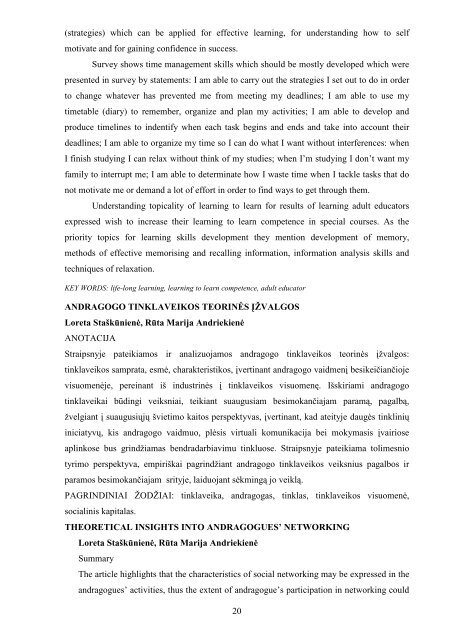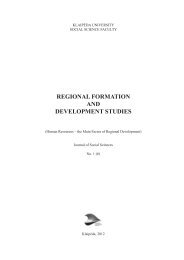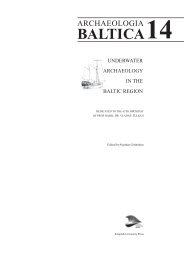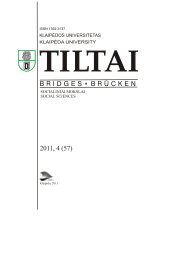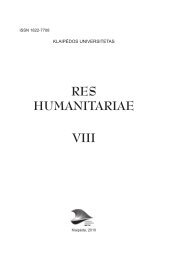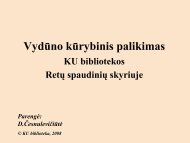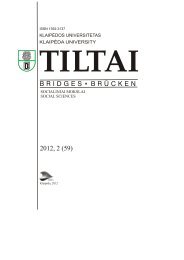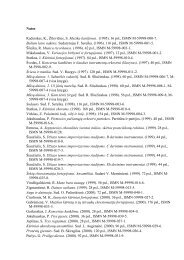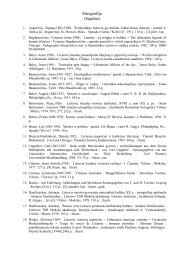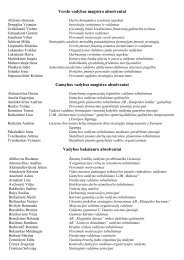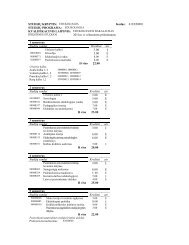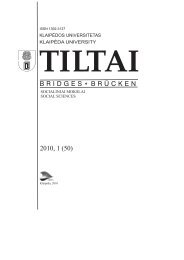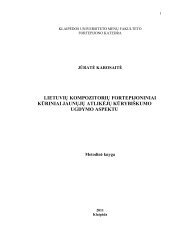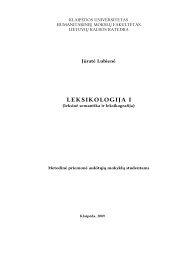ANDRAGOGIKOS MOKSLO ŽURNALAS Nr. 2 - KlaipÄdos ...
ANDRAGOGIKOS MOKSLO ŽURNALAS Nr. 2 - KlaipÄdos ...
ANDRAGOGIKOS MOKSLO ŽURNALAS Nr. 2 - KlaipÄdos ...
You also want an ePaper? Increase the reach of your titles
YUMPU automatically turns print PDFs into web optimized ePapers that Google loves.
(strategies) which can be applied for effective learning, for understanding how to self<br />
motivate and for gaining confidence in success.<br />
Survey shows time management skills which should be mostly developed which were<br />
presented in survey by statements: I am able to carry out the strategies I set out to do in order<br />
to change whatever has prevented me from meeting my deadlines; I am able to use my<br />
timetable (diary) to remember, organize and plan my activities; I am able to develop and<br />
produce timelines to indentify when each task begins and ends and take into account their<br />
deadlines; I am able to organize my time so I can do what I want without interferences: when<br />
I finish studying I can relax without think of my studies; when I’m studying I don’t want my<br />
family to interrupt me; I am able to determinate how I waste time when I tackle tasks that do<br />
not motivate me or demand a lot of effort in order to find ways to get through them.<br />
Understanding topicality of learning to learn for results of learning adult educators<br />
expressed wish to increase their learning to learn competence in special courses. As the<br />
priority topics for learning skills development they mention development of memory,<br />
methods of effective memorising and recalling information, information analysis skills and<br />
techniques of relaxation.<br />
KEY WORDS: life-long learning, learning to learn competence, adult educator<br />
ANDRAGOGO TINKLAVEIKOS TEORINĖS ĮŽVALGOS<br />
Loreta Staškūnienė, Rūta Marija Andriekienė<br />
ANOTACIJA<br />
Straipsnyje pateikiamos ir analizuojamos andragogo tinklaveikos teorinės įžvalgos:<br />
tinklaveikos samprata, esmė, charakteristikos, įvertinant andragogo vaidmenį besikeičiančioje<br />
visuomenėje, pereinant iš industrinės į tinklaveikos visuomenę. Išskiriami andragogo<br />
tinklaveikai būdingi veiksniai, teikiant suaugusiam besimokančiajam paramą, pagalbą,<br />
žvelgiant į suaugusiųjų švietimo kaitos perspektyvas, įvertinant, kad ateityje daugės tinklinių<br />
iniciatyvų, kis andragogo vaidmuo, plėsis virtuali komunikacija bei mokymasis įvairiose<br />
aplinkose bus grindžiamas bendradarbiavimu tinkluose. Straipsnyje pateikiama tolimesnio<br />
tyrimo perspektyva, empiriškai pagrindžiant andragogo tinklaveikos veiksnius pagalbos ir<br />
paramos besimokančiajam srityje, laiduojant sėkmingą jo veiklą.<br />
PAGRINDINIAI ŽODŽIAI: tinklaveika, andragogas, tinklas, tinklaveikos visuomenė,<br />
socialinis kapitalas.<br />
THEORETICAL INSIGHTS INTO ANDRAGOGUES’ NETWORKING<br />
Loreta Staškūnienė, Rūta Marija Andriekienė<br />
Summary<br />
The article highlights that the characteristics of social networking may be expressed in the<br />
andragogues’ activities, thus the extent of andragogue’s participation in networking could<br />
20


